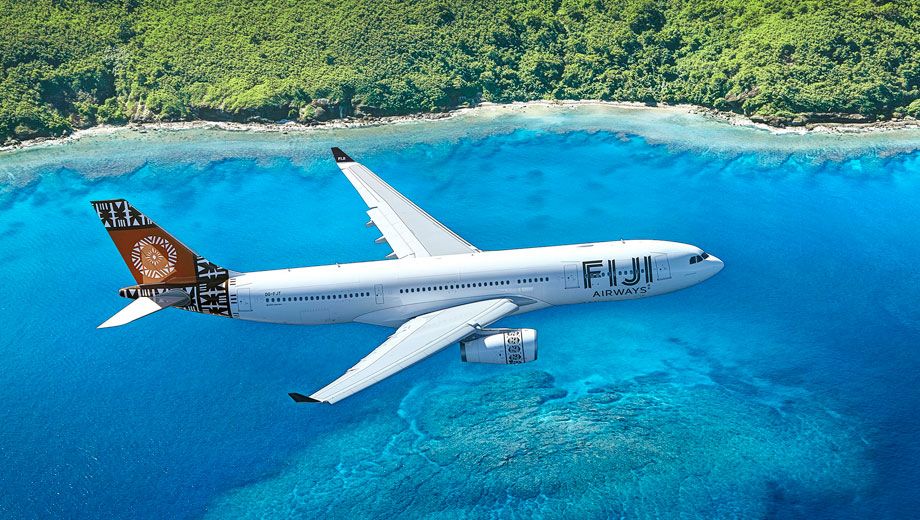Fiji Airways expands fleet with new Airbus, Boeing planes

Fiji Airways will add five aircraft to its fleet over the next three years, including an additional Airbus A330 and two Boeing 737-800s, as a cornerstone to the airline's five year strategic plan to become "a world class boutique airline" with more passengers and higher profits.
The Fijian carrier will also seek to expand its network through 'key airline partnerships' such as with Qantas.
“It is our aim is to be a world class boutique airline" proclaims Fiji Airways CEO Stefan Pichler, "and we must match that with an ambitious but solid financial growth plan which expands on current successes and takes our airline to a new level.”
The airline isn't locked in to how the new aircraft will arrive, saying that the fleet expansion will be achieved by "purchase and/or leasing".
In addition to the new Airbus and Boeing planes, Fiji Airways will also pick up two ATR 72-600s turboprops – one as a replacement for an existing ATR 42-500.
The airline says the additional aircraft will support the company’s plans to grow the number of available seats across all markets by 35% and increase in passenger numbers by 39%, over the next five years.
'Yes' to airline alliances...
"In terms of our network expansion plans, we will not be taking a ‘trial and error’ approach" Pichler says.
"We are focused on the deliberate selection of new routes together with the best airline partnerships. Selection and timings of new routes will depend on detailed scheduling studies together with interlining and code-sharing opportunities, and we will announce these as they are finalised."
Proposed capacity increases across the regions include Asia (144%), Pacific Islands (86.6%), New Zealand (58.9%), Australia (28.4%) and Domestic (12.3%), while the current seat availability to the US will slip back by 4.7%.
But 'No' to Star Alliance et al
However, while Fiji Airways is looking to grow its partnership with Qantas to include codeshared flights, the airline sees no value in joining any of the airline alliance families such as oneworld, Star Alliance and SkyTeam.
"I don't believe in any of these alliances" Pichler told Australian Business Traveller late last year.
"I was part of a Star Alliance team in Lufthansa, it was a good solution in the '90s, but now you have to choose partnerships which fit your network (through) codeshare and interline agreements."
Having last year transformed itself from Air Pacific, Fiji Airways is now continuing its ambitious rebranding campaign with the debut of Fiji Link – a new name for the airline's domestic and regional arm currently known as Pacific Sun.
Fiji Link will take delivery of a new ATR-72 turbo-prop aircraft in May this year, which will allow Fiji Airways to commence direct flights between Sydney and Suva, the island-nation's capital city by freeing up a Boeing 737-700 for this route.
Fiji Airways' transition from Air Pacific has also included a new uniform which celebrates Fijian culture and incorporate 'masi' brandmarks already seen on Fiji Airways' latest Airbus A330.
Photo gallery: Fiji Airways' new uniform
Follow Australian Business Traveller on Twitter: we're @AusBT


Qantas - Qantas Frequent Flyer
25 May 2012
Total posts 580
I don't entirely agree with Pichler's perspective that alliances (eg. Star Alliance, oneworld, SkyTeam) limit a carrier's options on partnerships. That may be a common restriction among Star Alliance members.
However, Malaysia Airlines has publicly announced that they've seen a dramatic improvement in underlying profits as a direct result of having joined oneworld a little under a year ago. Joining oneworld levelled the playing field instead of being the 'unaligned meat' between the 'Star Alliance sandwich' of Thai Airways & Singapore Airlines. They've also kept Air France/KLM as codeshare partners, though no longer partner with Delta due to their partnership with AA.
For smaller, end-of-the-line carriers such as Fiji Airways, joining an alliance wouldn't make sense as it wouldn't attract a huge number of alliance customers while potentially sabotaging passenger flow from carriers external to the alliance.
Cathay Pacific - Asia Miles
25 Apr 2013
Total posts 542
I respect your opinions but Fiji Airways is not "end-of-the-line". If they have money to fly flights 10.5 hrs long, they're pretty progressive.
19 Mar 2013
Total posts 3
End of line carrier refers to airlines that operate flights to one stop and then turnaround to to return to the departure point rather than continue to another destination after the stop. Many airlines in the region see partnerships as of more benefit than alliances.. See Air Nz and QF.
Qantas - Qantas Frequent Flyer
25 May 2012
Total posts 580
@Alvin - As rubbernecker has explained, 'end-of-line' carriers operate from the hub city to other regional cities as well as major hubs such as HKG, LAX & SYD. A lot of their passengers would be ending their journey upon arrival on one of their flights instead of transiting onto another flight.
This is in direct comparison to hub carriers, such as Emirates or Lufthansa, whereby most of their passengers aren't stopping in Dubai/Frankfurt but are continuing their journey onto a secondary destination.
Hi Guest, join in the discussion on Fiji Airways expands fleet with new Airbus, Boeing planes